Եվ արցունքնենրն իրեն կապույտ աչքերուն մեջ խեղդելով,
Մոխրադաշտի մը վրա, ուր հայ կյանքը դեռ կը մեռներ,
Այսպես պատմեց մեր սարսափին ականատես Գերմանուհին.
Այս անպատմելի պատմությունը որ ձեզ կ՚ընեմ,
Ես իմ անգութ աչքերովս այս մարդկային,
Իմ անվտանգ տնակիս գեհենադիր լուսամուտեն,
Ակռաներս կրճտելով ու զարյույթով զարհուրելի...
Այս աչքերովս անգթորեն մարդկային ես տեսա:
Մորխրակույտի վերածված Պարտեզ քաղաքին մեջ էր:
Դիակները դիզված էին մինչեւ կատարը ծառերուն,
Եւ ջուրերեն, աղբյուրներեն, առուներեն, ճամփաներեն,
Ձեր արյունին կարակչյաունն ըմբորստաձայն....
Դեռ ականջիս իր վրեժն ահավասիկ որ կը խոսի...
Օ՜, չի սոսկաք, երբ անպատմելի պատմությունս ձեզ պատմեմ...
Թող մարդերը հասկնանա մարդուն ոճիրը մարդուն դեմ,
Երկու օրվան արեւին տակ, գերեզմանին ճամփուն վրա
Մարդուն չարիքը մարդուն դեմ,
Թո՛ղ աշխարհիս բոլոր սրտերն իմանան...:
Այդ մահաշուք առավոտը կիրակի էր,
Դիակներուն վրա ծագող առաջին եւ անօգուտ կիրակին,
Երբ սենյակիս մեջը իրիկունեն մինչեւ արշալույս,
Դաշունահար աղջկան մը հոգեվարքին վրա ծռած՝
Արցունքներովս անոր մահը կը թրձեի...
Հանկարծ հեռուեն սեւ խուժան մը անասնականլ,
Քսան հարսներ իրենց հետ՝ մոլեգնորոն մտրակելով,
Շվայտության երգերով, այգիի մը մեջ կանգնեցան:
Ես կիսամեռ խեղճ աղջիկն իր խշտյակին վրա լքած,
Դժոխահայաց պատուհանիս պատշգամբին մոտեցա...:
Այգիին մեջ սեւ խուժանն անտառվեցավ:
Վայրենի մը՝ հարսներուն – Պետք է պարե՛ք, որոտաց,
Պետք է պարե՛ք, երբ մեր թմբուկը հնչե:
Եվ մտրակներն սկսան մահակարոտ հայ կիներուն
Մարմիններուն վրա կատաղությամբ մը շառաչել...
Քսան հարսներն ձեռք ձեռքի, իրենց շուրջպարն սկսան...
Աչվըներեն իրենց արցունքը վերքերուն պես կը հոսեր,
Ա՛հ, ես ո՜րչափ նախանձեցա իմ դրացի վիրավորիս,
Որովհետեւ լսեցի որ հռնդյունով մը հանդարտ,
Տիեզերքն անիծելեն, խեղճ հայուհին գեղադեմ,
Իր տատրակի շուշան հոգուն դեպի աստղերը թեւ տվավ...
Ունայնորեն կռուփներս ամբոխին դեմ շարժեցի:
«Պե՛տք է պարեք, կ՚ոռնար խուժանը մոլեգին,
Մինչեւ ձեր մահը պե՛տք է պարեք, դո՛ւք անհավատ գեղեցիկներ,
Կուրծքերնիդ բաց՝ պե՛տք է պարե՛ք, մեզ ժպտելով եւ անտըրտունջ...
Հոգնությոնը ձեզ համար չէ, ո՛չ ալ ամոթը ձեզ համար,
Ստրուկներ եք, պե՛տք է պարեք, եւ մերկանդամ եւ հոլանի,
Մինչեւ ձեր մահը պե՛տք է պարեք պագշոտորեն եւ ցոփությամբ,
Մեր աչքերը ծարավի են ձեր ձեւերուն եւ ձեր մահվան...»:
Քսան հարսներն գեղադեմ, գետին ինկան պարտասած...
«Ոտքի՛ ելեք», գոռացին, մերկ սուրերնին օձերու պես շարժելով...
Հետո մեկը սափորով քարյուղ բերավ խուժանաին...
Ո՜վ մարդկային արդարություն, թո՛ղ ես թքնեմ քու ճակատիդ...
Քսան հարսներն շտապով այդ հեղուկովն օծեցին...
«Պե՛տք է պարեք, որոտաց, ահավասի՛կ ձեզի բուրմունք մը,
որ Արաբիան իսկ չունի...»,
Հետո ջահով մը բռնկցուցին մերկ մարմինները հարսներուն:
Եվ ածխացած դիակները պարին միջեն դեպի մահը գլորեցան...:
Զարհուրանքես՝ ¬ պատուհանիս փեղկերը՝ փոթորիկի մը պես փակելով՝
Իր մենավոր մոտենալով հարցուցի.
Ի՞նչպես փորել այս աչքերս, ի՞նչպես փորել, ըսե՛ ինձ...:
Մոխրադաշտի մը վրա, ուր հայ կյանքը դեռ կը մեռներ,
Այսպես պատմեց մեր սարսափին ականատես Գերմանուհին.
Այս անպատմելի պատմությունը որ ձեզ կ՚ընեմ,
Ես իմ անգութ աչքերովս այս մարդկային,
Իմ անվտանգ տնակիս գեհենադիր լուսամուտեն,
Ակռաներս կրճտելով ու զարյույթով զարհուրելի...
Այս աչքերովս անգթորեն մարդկային ես տեսա:
Մորխրակույտի վերածված Պարտեզ քաղաքին մեջ էր:
Դիակները դիզված էին մինչեւ կատարը ծառերուն,
Եւ ջուրերեն, աղբյուրներեն, առուներեն, ճամփաներեն,
Ձեր արյունին կարակչյաունն ըմբորստաձայն....
Դեռ ականջիս իր վրեժն ահավասիկ որ կը խոսի...
Օ՜, չի սոսկաք, երբ անպատմելի պատմությունս ձեզ պատմեմ...
Թող մարդերը հասկնանա մարդուն ոճիրը մարդուն դեմ,
Երկու օրվան արեւին տակ, գերեզմանին ճամփուն վրա
Մարդուն չարիքը մարդուն դեմ,
Թո՛ղ աշխարհիս բոլոր սրտերն իմանան...:
Այդ մահաշուք առավոտը կիրակի էր,
Դիակներուն վրա ծագող առաջին եւ անօգուտ կիրակին,
Երբ սենյակիս մեջը իրիկունեն մինչեւ արշալույս,
Դաշունահար աղջկան մը հոգեվարքին վրա ծռած՝
Արցունքներովս անոր մահը կը թրձեի...
Հանկարծ հեռուեն սեւ խուժան մը անասնականլ,
Քսան հարսներ իրենց հետ՝ մոլեգնորոն մտրակելով,
Շվայտության երգերով, այգիի մը մեջ կանգնեցան:
Ես կիսամեռ խեղճ աղջիկն իր խշտյակին վրա լքած,
Դժոխահայաց պատուհանիս պատշգամբին մոտեցա...:
Այգիին մեջ սեւ խուժանն անտառվեցավ:
Վայրենի մը՝ հարսներուն – Պետք է պարե՛ք, որոտաց,
Պետք է պարե՛ք, երբ մեր թմբուկը հնչե:
Եվ մտրակներն սկսան մահակարոտ հայ կիներուն
Մարմիններուն վրա կատաղությամբ մը շառաչել...
Քսան հարսներն ձեռք ձեռքի, իրենց շուրջպարն սկսան...
Աչվըներեն իրենց արցունքը վերքերուն պես կը հոսեր,
Ա՛հ, ես ո՜րչափ նախանձեցա իմ դրացի վիրավորիս,
Որովհետեւ լսեցի որ հռնդյունով մը հանդարտ,
Տիեզերքն անիծելեն, խեղճ հայուհին գեղադեմ,
Իր տատրակի շուշան հոգուն դեպի աստղերը թեւ տվավ...
Ունայնորեն կռուփներս ամբոխին դեմ շարժեցի:
«Պե՛տք է պարեք, կ՚ոռնար խուժանը մոլեգին,
Մինչեւ ձեր մահը պե՛տք է պարեք, դո՛ւք անհավատ գեղեցիկներ,
Կուրծքերնիդ բաց՝ պե՛տք է պարե՛ք, մեզ ժպտելով եւ անտըրտունջ...
Հոգնությոնը ձեզ համար չէ, ո՛չ ալ ամոթը ձեզ համար,
Ստրուկներ եք, պե՛տք է պարեք, եւ մերկանդամ եւ հոլանի,
Մինչեւ ձեր մահը պե՛տք է պարեք պագշոտորեն եւ ցոփությամբ,
Մեր աչքերը ծարավի են ձեր ձեւերուն եւ ձեր մահվան...»:
Քսան հարսներն գեղադեմ, գետին ինկան պարտասած...
«Ոտքի՛ ելեք», գոռացին, մերկ սուրերնին օձերու պես շարժելով...
Հետո մեկը սափորով քարյուղ բերավ խուժանաին...
Ո՜վ մարդկային արդարություն, թո՛ղ ես թքնեմ քու ճակատիդ...
Քսան հարսներն շտապով այդ հեղուկովն օծեցին...
«Պե՛տք է պարեք, որոտաց, ահավասի՛կ ձեզի բուրմունք մը,
որ Արաբիան իսկ չունի...»,
Հետո ջահով մը բռնկցուցին մերկ մարմինները հարսներուն:
Եվ ածխացած դիակները պարին միջեն դեպի մահը գլորեցան...:
Զարհուրանքես՝ ¬ պատուհանիս փեղկերը՝ փոթորիկի մը պես փակելով՝
Իր մենավոր մոտենալով հարցուցի.
Ի՞նչպես փորել այս աչքերս, ի՞նչպես փորել, ըսե՛ ինձ...:
inviata da DonQuijote82 + CCG/AWS Staff - 15/10/2011 - 16:34
Lingua: Inglese
Versione inglese di Peter Balakian e Nevart Yaghlian
Translated by Peter Balakian and Nevart Yaghlian
Translated by Peter Balakian and Nevart Yaghlian
THE DANCE
In a field of cinders where Armenian life
was still dying,
a German woman, trying not to cry
told me the horror she witnessed:
"This thing I'm telling you about,
I saw with my own eyes,
Behind my window of hell
I clenched my teeth
and watched the town of Bardez turn
into a heap of ashes.
The corpses were piled high as trees,
and from the springs, from the streams and the road,
the blood was a stubborn murmur,
and still calls revenge in my ear.
Don't be afraid; I must tell you what I saw.
so people will understand
the crimes men do to men.
For two days, by the road to the graveyard …
Let the hearts of the world understand,
It was Sunday morning,
the first useless Sunday dawning on the corpses.
From dawn to dusk I had been in my room
with a stabbed woman —
my tears wetting her death —
when I heard from afar
a dark crowd standing in a vineyard
lashing twenty brides
and singing filthy songs.
Leaving the half-dead girl on the straw mattress,
I went to the balcony of my window
and the crowd seemed to thicken like a clump of trees
An animal of a man shouted, "You must dance,
dance when our drum beats."
With fury whips cracked
on the flesh of these women.
Hand in hand the brides began their circle dance.
Now, I envied my wounded neighbor
because with a calm snore she cursed
the universe and gave up her soul to the stars …
"Dance," they raved,
"dance till you die, infidel beauties
With your flapping tits, dance!
Smile for us. You're abandoned now,
you're naked slaves,
so dance like a bunch of fuckin' sluts.
We're hot for your dead bodies."
Twenty graceful brides collapsed.
"Get up," the crowd screamed,
brandishing their swords.
Then someone brought a jug of kerosene.
Human justice, I spit in your face.
The brides were anointed.
"Dance," they thundered —
"here's a fragrance you can't get in Arabia."
With a torch, they set
the naked brides on fire.
And the charred bodies rolled
and tumbled to their deaths …
I slammed my shutters,
sat down next to my dead girl
and asked: "How can I dig out my eyes?"
In a field of cinders where Armenian life
was still dying,
a German woman, trying not to cry
told me the horror she witnessed:
"This thing I'm telling you about,
I saw with my own eyes,
Behind my window of hell
I clenched my teeth
and watched the town of Bardez turn
into a heap of ashes.
The corpses were piled high as trees,
and from the springs, from the streams and the road,
the blood was a stubborn murmur,
and still calls revenge in my ear.
Don't be afraid; I must tell you what I saw.
so people will understand
the crimes men do to men.
For two days, by the road to the graveyard …
Let the hearts of the world understand,
It was Sunday morning,
the first useless Sunday dawning on the corpses.
From dawn to dusk I had been in my room
with a stabbed woman —
my tears wetting her death —
when I heard from afar
a dark crowd standing in a vineyard
lashing twenty brides
and singing filthy songs.
Leaving the half-dead girl on the straw mattress,
I went to the balcony of my window
and the crowd seemed to thicken like a clump of trees
An animal of a man shouted, "You must dance,
dance when our drum beats."
With fury whips cracked
on the flesh of these women.
Hand in hand the brides began their circle dance.
Now, I envied my wounded neighbor
because with a calm snore she cursed
the universe and gave up her soul to the stars …
"Dance," they raved,
"dance till you die, infidel beauties
With your flapping tits, dance!
Smile for us. You're abandoned now,
you're naked slaves,
so dance like a bunch of fuckin' sluts.
We're hot for your dead bodies."
Twenty graceful brides collapsed.
"Get up," the crowd screamed,
brandishing their swords.
Then someone brought a jug of kerosene.
Human justice, I spit in your face.
The brides were anointed.
"Dance," they thundered —
"here's a fragrance you can't get in Arabia."
With a torch, they set
the naked brides on fire.
And the charred bodies rolled
and tumbled to their deaths …
I slammed my shutters,
sat down next to my dead girl
and asked: "How can I dig out my eyes?"
Lingua: Italiano
Versione italiana di Riccardo Venturi
(Dalla versione inglese)
2 novembre 2011
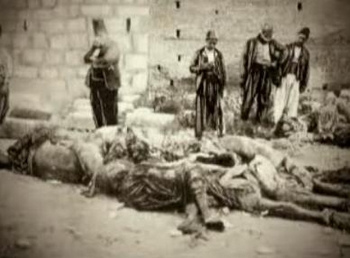
(Dalla versione inglese)
2 novembre 2011

Il massacro di Adana.
In un campo di ceneri, dove la vita armena
ancora stava morendo,
una donna tedesca, cercando di non piangere
mi raccontò l'orrore di cui fu testimone:
“Questa cosa che ti sto raccontando
l'ho vista coi miei occhi,
da dietro la mia finestra infernale
ho stretto i denti
e ho visto il paese di Bardez
ridotto a un mucchio di cenere.
I cadaveri formavano pile alte come alberi,
e dalle fonti, dai fiumi e dalla strada
il sangue gorgogliava cupo
e ancora grida vendetta nei miei orecchi.
Non avere paura; devo dirti quel che ho visto,
così la gente capirà
i crimini che gli uomini fanno agli uomini.
Per due giorni, sulla strada per il cimitero...
Lo capiscano i cuori del mondo,
era una domenica mattina,
la prima inutile domenica che sorgeva sui cadaveri.
Dall'alba al tramonto ero rimasta in camera
con una donna pugnalata,
le mie lacrime bagnavano la sua morte -
quando sentii da lontano
una folla cupa che stava in un vigneto
mentre frustava venti ragazze
cantando canzoni oscene.
Lasciai la ragazza moribonda sul pagliericcio
e andai al balcone della mia finestra;
la folla sembrava addensarsi come folto d'alberi
mentre una bestia d'uomo gridava, “Dovete danzare,
danzare al rullo del tamburo.”
Con furore le fruste schioccavano
sulla carne di quelle donne.
Mano nella mano, le ragazze cominciarono a danzare in tondo.
In quel momento invidiai la mia vicina ferita
perché, con un rantolo tranquillo,
malediceva l'universo e affidava l'anima alle stelle...
“Danzate”, urlavano,
“danzate fino a morire, bellezze infedeli
con i vostri seni che sbattono, danzate!
Sorrideteci, ora siete abbandonate,
voi, schiave nude,
e allora danzate come un branco di troie,
ci eccitano i vostri corpi morti.”
Venti graziose ragazze crollarono a terra.
“Alzatevi”, gridava la folla
brandendo le spade.
Allora qualcuno portò un bidone di kerosene,
giustizia umana, io ti sputo in faccia.
Le ragazze furono unte.
“Danzate”, urlarono come tuono,
“eccovi un'essenza che non trovereste in Arabia.”
Con una torcia diedero
fuoco alle ragazze nude.
E i corpi carbonizzati rotolarono
cadendo nella morte.
Chiusi sbattendo le persiane,
mi sedetti accanto alla ragazza morta
e le chiesi: “Come posso cavarmi gli occhi?”
ancora stava morendo,
una donna tedesca, cercando di non piangere
mi raccontò l'orrore di cui fu testimone:
“Questa cosa che ti sto raccontando
l'ho vista coi miei occhi,
da dietro la mia finestra infernale
ho stretto i denti
e ho visto il paese di Bardez
ridotto a un mucchio di cenere.
I cadaveri formavano pile alte come alberi,
e dalle fonti, dai fiumi e dalla strada
il sangue gorgogliava cupo
e ancora grida vendetta nei miei orecchi.
Non avere paura; devo dirti quel che ho visto,
così la gente capirà
i crimini che gli uomini fanno agli uomini.
Per due giorni, sulla strada per il cimitero...
Lo capiscano i cuori del mondo,
era una domenica mattina,
la prima inutile domenica che sorgeva sui cadaveri.
Dall'alba al tramonto ero rimasta in camera
con una donna pugnalata,
le mie lacrime bagnavano la sua morte -
quando sentii da lontano
una folla cupa che stava in un vigneto
mentre frustava venti ragazze
cantando canzoni oscene.
Lasciai la ragazza moribonda sul pagliericcio
e andai al balcone della mia finestra;
la folla sembrava addensarsi come folto d'alberi
mentre una bestia d'uomo gridava, “Dovete danzare,
danzare al rullo del tamburo.”
Con furore le fruste schioccavano
sulla carne di quelle donne.
Mano nella mano, le ragazze cominciarono a danzare in tondo.
In quel momento invidiai la mia vicina ferita
perché, con un rantolo tranquillo,
malediceva l'universo e affidava l'anima alle stelle...
“Danzate”, urlavano,
“danzate fino a morire, bellezze infedeli
con i vostri seni che sbattono, danzate!
Sorrideteci, ora siete abbandonate,
voi, schiave nude,
e allora danzate come un branco di troie,
ci eccitano i vostri corpi morti.”
Venti graziose ragazze crollarono a terra.
“Alzatevi”, gridava la folla
brandendo le spade.
Allora qualcuno portò un bidone di kerosene,
giustizia umana, io ti sputo in faccia.
Le ragazze furono unte.
“Danzate”, urlarono come tuono,
“eccovi un'essenza che non trovereste in Arabia.”
Con una torcia diedero
fuoco alle ragazze nude.
E i corpi carbonizzati rotolarono
cadendo nella morte.
Chiusi sbattendo le persiane,
mi sedetti accanto alla ragazza morta
e le chiesi: “Come posso cavarmi gli occhi?”
Lingua: Spagnolo
Versione spagnola di Nicolás Alvarado
Traducción de Nicolás Alvarado
Traducción de Nicolás Alvarado
EL BAILE
En un campo de cenizas donde la vida armenia
seguía muriendo,
una alemana, tratando de no llorar,
me narró el horror que atestiguó:
“Esto que te cuento
lo vi con mis propios ojos.
Tras mi ventana infernal
apreté los dientes
y vi el pueblo de Bardez ser reducido
a un montón de cenizas.
Los cadáveres se alzaban en pilas tan altas como un árbol
y, de los manantiales, de las corrientes y de los caminos,
la sangre emitía un terco murmullo
que aún clama venganza en mis oidos.
No temas; debo contarte lo que vi
para que la gente conozca
los crímenes que el hombre inflige al hombre.
Durante dos días, junto al camino al cementerio.
Que los corazones del mundo comprendan!
Era una mañana de domingo,
del primer domingo inútil que amanecia sobre los cadaveres.
Del crepúsculo al ocaso había estado en mi habitación
con una mujer apuñalada
-su muerte humedecida por mis lágrimas-
cuando escuché a lo lejos,
parada en un viñedo, a una turba oscura
que azotaba a veinte vírgenes
y entonaba cantos inmundos.
Dejé a la chica medio muerta en el colchón de paja
y salí al balcón de mi ventana.
La turba parecía crecer como una mata.
Un animal humano gritó “ Debéis danzar,
danzar al son de nuestro tambor!”
Con furia chasquearon los latigos
sobre las carnes de estas mujeres.
Tomadas de la mano, las vírgenes comenzaron su
danza circular. Envidiaba ahora a mi vecina herida
quien, con un calmo ronquido,
maldecía al universo y entregaba su alma a las estrellas...
“¡Bailen!, clamaban
“¡Bailen hasta la muerte, bellezas infieles!
¡Bailen con vuestras tetas batientes!
¡¡Sonreídnos!! ¡Estáis perdidas!
¡Sois esclavas desnudas!
¡Bailen, pues, como un racimo de miserables putas!
¡Vuestros cuerpos muertos nos ponen calientes!”
Veinte agraciadas vírgenes se desplomaron.
“¡Levantaos!”, gritaba la turba
blandiendo sus espadas.
Alguién trajo entonces un jarro de keroseno.
Justicia humana, escupo tu faz.
Los vírgenes fueron ungidas.
“¡Bailen!, rugieron:
“¡He aqui una fragrancia que no se encuentra en Arabia!”
Con una antorcha
prendieron fuego a los cuerpos desnudos
y los cuerpos calcinados rodaron
hasta alcanzar la muerte...
Cerré mi ventana,
me senté junto a mi muerta
y pregunté: “¿Cómo puedo arrancarme los ojos?"
En un campo de cenizas donde la vida armenia
seguía muriendo,
una alemana, tratando de no llorar,
me narró el horror que atestiguó:
“Esto que te cuento
lo vi con mis propios ojos.
Tras mi ventana infernal
apreté los dientes
y vi el pueblo de Bardez ser reducido
a un montón de cenizas.
Los cadáveres se alzaban en pilas tan altas como un árbol
y, de los manantiales, de las corrientes y de los caminos,
la sangre emitía un terco murmullo
que aún clama venganza en mis oidos.
No temas; debo contarte lo que vi
para que la gente conozca
los crímenes que el hombre inflige al hombre.
Durante dos días, junto al camino al cementerio.
Que los corazones del mundo comprendan!
Era una mañana de domingo,
del primer domingo inútil que amanecia sobre los cadaveres.
Del crepúsculo al ocaso había estado en mi habitación
con una mujer apuñalada
-su muerte humedecida por mis lágrimas-
cuando escuché a lo lejos,
parada en un viñedo, a una turba oscura
que azotaba a veinte vírgenes
y entonaba cantos inmundos.
Dejé a la chica medio muerta en el colchón de paja
y salí al balcón de mi ventana.
La turba parecía crecer como una mata.
Un animal humano gritó “ Debéis danzar,
danzar al son de nuestro tambor!”
Con furia chasquearon los latigos
sobre las carnes de estas mujeres.
Tomadas de la mano, las vírgenes comenzaron su
danza circular. Envidiaba ahora a mi vecina herida
quien, con un calmo ronquido,
maldecía al universo y entregaba su alma a las estrellas...
“¡Bailen!, clamaban
“¡Bailen hasta la muerte, bellezas infieles!
¡Bailen con vuestras tetas batientes!
¡¡Sonreídnos!! ¡Estáis perdidas!
¡Sois esclavas desnudas!
¡Bailen, pues, como un racimo de miserables putas!
¡Vuestros cuerpos muertos nos ponen calientes!”
Veinte agraciadas vírgenes se desplomaron.
“¡Levantaos!”, gritaba la turba
blandiendo sus espadas.
Alguién trajo entonces un jarro de keroseno.
Justicia humana, escupo tu faz.
Los vírgenes fueron ungidas.
“¡Bailen!, rugieron:
“¡He aqui una fragrancia que no se encuentra en Arabia!”
Con una antorcha
prendieron fuego a los cuerpos desnudos
y los cuerpos calcinados rodaron
hasta alcanzar la muerte...
Cerré mi ventana,
me senté junto a mi muerta
y pregunté: “¿Cómo puedo arrancarme los ojos?"
inviata da DonQuijote82 - 15/10/2011 - 16:35
Lingua: Greco moderno
Versione greca di Riccardo Venturi
2/3 novembre 2011
Μετάφραση: Ρικάρντος Βεντούρης
2*3 Νοεμβρίου 2011
2/3 novembre 2011
Μετάφραση: Ρικάρντος Βεντούρης
2*3 Νοεμβρίου 2011
Ο ΧΟΡΟΣ
Σ'έναν κάμπο στάχτης, όπου η αρμενική ζωή
πέθαινε ακόμα,
μια Γερμανίδα, προσπαθώντας να μην κλάψει
μου διηγήθηκε για τη φρικαλεότητα που την είδε.
“Αυτό που σου το διηγούμαι
το είδα με τα μάτια μου
πίσω από το παράθυρό μου της κόλασης.
Έσφιγξα τα δόντια μου
κι είδα το χωριό Μπαρντέζ
που το μετέβαλαν σ'ένα σωρό στάχτης.
Τα πτώματα σε στοίβες ψηλές σα δέντρα,
κι από τις πηγές, τα ποτάμια και το δρόμο
το αίμα γουργούριζε υπόκωφο
κι ακόμα φωνάζει εκδίκηση στ'αυτιά μου.
Μη φοβήσου. Πρέπει να σου πω τι είδα,
κι έτσι ο κόσμος θα καταλάβει
τι είδους εγκλήματα οι άνθρωποι κάνουν στους ανθρώπους.
Για δύο μέρες, στο δρόμο για το κοιμητήριο...
Να το καταλάβουν οι καρδιές του κόσμου,
ήταν μια κυριακή το πρωί,
η πρώτη, ανώφελη κυριακή που ανέτελλε πάνω από τα πτώματα.
Απ'το πρωί στο βράδυ είχα μείνει στο δωμάτιό μου
μαζί με μία μαχαιρωμένη γυναίκα,
τα δάκρυά μου βρέχανε τον θάνατό της -
όταν άκουσα από μακριά
ένα υπόκωφο πλήθος σ'έναν αμπελώνα
να μαστιγώνει είκοσι κορίτσια
τραγουδώντας αισχρά τραγούδια.
Άφησα τη γυναίκα να ψυχομαχεί στο αχυρόστρωμα
και πήγα στο μπαλκόνι του παράθυρού μου.
Το πλήθος φαινόταν να πυκνωθεί σα δασιά δέντρα
ενώ ένα θηρίο άντρα φώναζε, Χορέψτε,
χορέψτε με τη τυμπανοκρουσία!
Με θυμό πλατάγιζαν τα μαστίγια
στη σάρκα εκείνων των γυναικών.
Χέρι στο χέρι, τα κορίτσια άρχισαν να χορέψουν σε κύκλο.
Σ'εκείνη τη στιγμή φθωνούσα την πληγωμένη μου γειτόνισσα
που άσθμαινε ήσυχα και καταριόταν
τον κόσμο και παράδιδε την ψυχή της στα αστέρια...
Χορέψτε, φωνάζανε,
Χορέψτε μέχρι να πεθάνετε, άπιστες καλλονές
με τις ρόγες σας που χτυπάνε, χορέψτε!
Χαμογελάστε μας τώρα, είστε μόνες,
εσείς, γυμνές σκλάβες,
κι έτσι χορέψτε, τσούρμο πουτάνες,
μας διεγείρουν τα νεκρά σας σώματα.
Είκοσι ωραία κορίτσια πέσανε καταγής.
Σταθείτε, φώναζε το πλήθος
κραδαίνοντας τα σπάθια.
Τότε κάποιος έφερε ένα μπετόνι κηροζίνη,
ανθρώπινη δικαιοσύνη, σου φτύνω στο μούτρο.
Λαδώθηκαν τα κορίτσια.
Χορέψτε, βροντούσανε,
ιδού ένα άρωμα που δε θα βρίσκατε στην Αραβία.
Με μία δάδα βάλανε
φωτιά στα γυμνά κορίτσια.
Και τα καμμένα σώματα
έπεσαν στον θάνατο.
Έκλεισα χτυπώντας το παντζούρι
και κάθισα κοντά στη πεθαμένη γυναίκα
και του ζήτησα, Πώς μπορώ ν'αποσπάσω τα μάτια μου;"
Σ'έναν κάμπο στάχτης, όπου η αρμενική ζωή
πέθαινε ακόμα,
μια Γερμανίδα, προσπαθώντας να μην κλάψει
μου διηγήθηκε για τη φρικαλεότητα που την είδε.
“Αυτό που σου το διηγούμαι
το είδα με τα μάτια μου
πίσω από το παράθυρό μου της κόλασης.
Έσφιγξα τα δόντια μου
κι είδα το χωριό Μπαρντέζ
που το μετέβαλαν σ'ένα σωρό στάχτης.
Τα πτώματα σε στοίβες ψηλές σα δέντρα,
κι από τις πηγές, τα ποτάμια και το δρόμο
το αίμα γουργούριζε υπόκωφο
κι ακόμα φωνάζει εκδίκηση στ'αυτιά μου.
Μη φοβήσου. Πρέπει να σου πω τι είδα,
κι έτσι ο κόσμος θα καταλάβει
τι είδους εγκλήματα οι άνθρωποι κάνουν στους ανθρώπους.
Για δύο μέρες, στο δρόμο για το κοιμητήριο...
Να το καταλάβουν οι καρδιές του κόσμου,
ήταν μια κυριακή το πρωί,
η πρώτη, ανώφελη κυριακή που ανέτελλε πάνω από τα πτώματα.
Απ'το πρωί στο βράδυ είχα μείνει στο δωμάτιό μου
μαζί με μία μαχαιρωμένη γυναίκα,
τα δάκρυά μου βρέχανε τον θάνατό της -
όταν άκουσα από μακριά
ένα υπόκωφο πλήθος σ'έναν αμπελώνα
να μαστιγώνει είκοσι κορίτσια
τραγουδώντας αισχρά τραγούδια.
Άφησα τη γυναίκα να ψυχομαχεί στο αχυρόστρωμα
και πήγα στο μπαλκόνι του παράθυρού μου.
Το πλήθος φαινόταν να πυκνωθεί σα δασιά δέντρα
ενώ ένα θηρίο άντρα φώναζε, Χορέψτε,
χορέψτε με τη τυμπανοκρουσία!
Με θυμό πλατάγιζαν τα μαστίγια
στη σάρκα εκείνων των γυναικών.
Χέρι στο χέρι, τα κορίτσια άρχισαν να χορέψουν σε κύκλο.
Σ'εκείνη τη στιγμή φθωνούσα την πληγωμένη μου γειτόνισσα
που άσθμαινε ήσυχα και καταριόταν
τον κόσμο και παράδιδε την ψυχή της στα αστέρια...
Χορέψτε, φωνάζανε,
Χορέψτε μέχρι να πεθάνετε, άπιστες καλλονές
με τις ρόγες σας που χτυπάνε, χορέψτε!
Χαμογελάστε μας τώρα, είστε μόνες,
εσείς, γυμνές σκλάβες,
κι έτσι χορέψτε, τσούρμο πουτάνες,
μας διεγείρουν τα νεκρά σας σώματα.
Είκοσι ωραία κορίτσια πέσανε καταγής.
Σταθείτε, φώναζε το πλήθος
κραδαίνοντας τα σπάθια.
Τότε κάποιος έφερε ένα μπετόνι κηροζίνη,
ανθρώπινη δικαιοσύνη, σου φτύνω στο μούτρο.
Λαδώθηκαν τα κορίτσια.
Χορέψτε, βροντούσανε,
ιδού ένα άρωμα που δε θα βρίσκατε στην Αραβία.
Με μία δάδα βάλανε
φωτιά στα γυμνά κορίτσια.
Και τα καμμένα σώματα
έπεσαν στον θάνατο.
Έκλεισα χτυπώντας το παντζούρι
και κάθισα κοντά στη πεθαμένη γυναίκα
και του ζήτησα, Πώς μπορώ ν'αποσπάσω τα μάτια μου;"
"Durante el genocidio, las vírgenes armenias torturadas y violadas eran obligadas a danzar ante los turcos, antes de ser inmoladas con escarnio público.
El genocidio de entre un millón y medio y dos millones de personas, hoy desdibujado, semi olvidado y poco recordado (no hay una "Lista de Schindler" sobre este holocausto), fue perpretado con la complicidad de las potencias occidentales, que permitieron la atrocidad para salvaguardar sus intereses estratégicos y comerciales."
Corazón armenio, dal blog Lost in Marienbad
El genocidio de entre un millón y medio y dos millones de personas, hoy desdibujado, semi olvidado y poco recordado (no hay una "Lista de Schindler" sobre este holocausto), fue perpretado con la complicidad de las potencias occidentales, que permitieron la atrocidad para salvaguardar sus intereses estratégicos y comerciales."
Corazón armenio, dal blog Lost in Marienbad
DonQuijote82 - 22/10/2011 - 11:26
Տէր Ողորմեա - Der Voghormia
Il canto liturgico Der Voghormia (qui trascritto Ter Vogormia, ma un'altra possibile trascrizione è Der Vogormea appartiene alla musica sacra tradizionale armena. Si tratta in pratica della resa del Kyrie eleison (Der Voghormia significa esattamente "Signore, abbi pietà"). Nel video seguente, l'intero canto:
Il testo armeno (reperito da questa pagina è il seguente:
Da notare che il Der Voghormia è anche la "traccia nascosta" nell'album Toxicity dei System of A Down, che sono armeni di origine.
Il canto liturgico Der Voghormia (qui trascritto Ter Vogormia, ma un'altra possibile trascrizione è Der Vogormea appartiene alla musica sacra tradizionale armena. Si tratta in pratica della resa del Kyrie eleison (Der Voghormia significa esattamente "Signore, abbi pietà"). Nel video seguente, l'intero canto:
Il testo armeno (reperito da questa pagina è il seguente:
1- Տէ՛ր ողորմեա, Տէ՛ր ողորմեա,
Տէ՛ր ողորմեա, Տէ՛ր ողորմեա՛
Der voghormia, Der voghormia,
Der voghormia, Der voghormia
2- Արի՛, Աստուած հարցն մերոց
Որ ապաւէն ես նեղելոց.
Ari, Asdvadz hartzn merotz
Vor abaven yes neghelotz
3- Հա՛ս յօգնութին ծառայից քոց,
Լեր պահապան ազգիս Հայոց:
Has oknoutyoun dzarayitz kotz
Ler bahaban azkis Hayotz
4- Ամենասուրբ Երրորդութիւն
Տո՛ւր աշխարհիս խաղաղութիւն,
Amenasourp Yerrortoutyoun
Dour ashkharhis khaghaghoutyoun
5- Տէ՛ր ողորմեա՛, Տէ՛ր ողորմեա՛,
Յիսուս Փրկիչ մեզ ողորմեա՛:
Der voghormia, Der voghormia,
Hisous Prgich mez voghormia
Տէ՛ր ողորմեա, Տէ՛ր ողորմեա՛
Der voghormia, Der voghormia,
Der voghormia, Der voghormia
2- Արի՛, Աստուած հարցն մերոց
Որ ապաւէն ես նեղելոց.
Ari, Asdvadz hartzn merotz
Vor abaven yes neghelotz
3- Հա՛ս յօգնութին ծառայից քոց,
Լեր պահապան ազգիս Հայոց:
Has oknoutyoun dzarayitz kotz
Ler bahaban azkis Hayotz
4- Ամենասուրբ Երրորդութիւն
Տո՛ւր աշխարհիս խաղաղութիւն,
Amenasourp Yerrortoutyoun
Dour ashkharhis khaghaghoutyoun
5- Տէ՛ր ողորմեա՛, Տէ՛ր ողորմեա՛,
Յիսուս Փրկիչ մեզ ողորմեա՛:
Der voghormia, Der voghormia,
Hisous Prgich mez voghormia
Da notare che il Der Voghormia è anche la "traccia nascosta" nell'album Toxicity dei System of A Down, che sono armeni di origine.
Riccardo Venturi - 2/11/2011 - 00:29
×
![]()

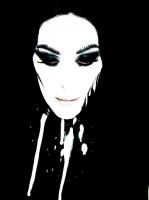
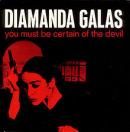




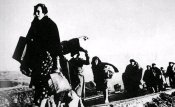
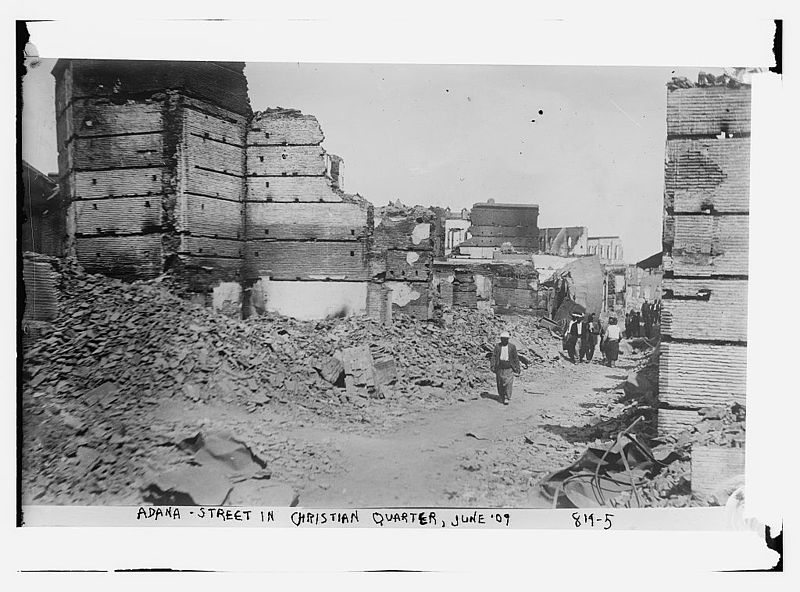
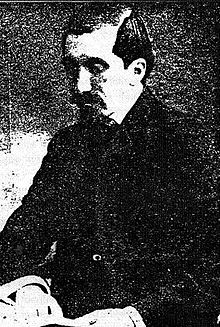
Musica di Diamanda Galás
Recitazione: Shakeh Kadehijan
Melodia liturgica: Տէր Ողորմյա (Ter Vogormia, Der Voghormia, Der Voghormea), eseguita da Marar Yekmalian
A poem by Ատոմ Եարճանեան [Atom Yarjanian], known as Սիամանթօ [Siamanto], 1909
Music by Diamanda Galás
Recited text: Shakeh Kadehijan
Liturgic melody: Տէր Ողորմյա (Ter Vogormia, Der Voghormia, Der Voghormea), performed by Marar Yekmalian
Album: Defixiones Will and Testament
Defixiones refers to the warnings engraved in lead which were placed on the graves of the dead in Greece and Asia Minor. They cautioned against moving or desecrating the corpses under threat of extreme harm.
Will and Testament refers to the last wishes of the dead who have been taken to their graves under unnatural circumstances.
The concert material that Galás has included in this song cycle includes music set to the texts of the Armenian poet/soldier Siamanto; the Belgian/French poet Henri Michaux; the Syrian/Lebanese poet Adonis; the rembetika songs of Sotiria Bellou; the Anatolian Greek Amanedhes; the blues music of the American musicians Boise Sturdevant and Blind Lemon Jefferson, and the sacred songs of the Deep South. A new addition to the song cycle is a striking piece written by Galás called "The World Has Gone Up In Flames", which premiered at Royce Hall (UCLA) November 2001. Galás warns that, even in death, those that were chosen to die have not been defeated nor are they forgotten. "My death is written in a rock that cannot be broken."
Defixiones, Will and Testament is dedicated to the forgotten and erased of the Armenian, Assyrian, and Anatolian Greek genocides which occurred between 1914 and 1923.
Defixiones si riferisce alle placche in piombo che erano sistemate sulle tombe dei morti in Grecia e in Asia Minore. Avvertivano di non spostare o profanare le salme, con la minaccia di conseguenze assai sgradevoli.
Will and Testament si riferisce alle ultime volontà dei defunti, che erano finiti nella tomba per circostanze non naturali.
Il materiale concertuale che Diamanda Galás ha inserito in questo ciclo di canzoni comprende testi del poeta militante armeno Siamanto, del poeta belga di lingua francese Henri Michaux, del poeta assiro libanese Adonis, le canzoni rebetika di Sotiria Bellou e del greco anatolico Amanedhes, i blues dei musicisti americani Boise Sturdevant e Blind Lemon Jefferson, e le canzoni sacre del Profondo Sud. Un'ulteriore aggiunta al ciclo di canzoni è rappresentata da un impressionante brano scritto dalla Galás stessa, intitolato The World Has Gone Up In Flames, eseguito per la prima volta alla Royce Hall dell'UCLA nel novembre 2001. Diamanda Galás avverte che, persino nella morte, coloro che vi erano stati costretti non sono stati né sconfitti, né dimenticati. “La mia morte è scritta su una roccia che non può essere spezzata”.
Defixiones, Will and Testament è dedicato alle vittime, dimenticate e cancellate, dei genocidi armeno, assiro e greco-anatolico che ebbero luogo tra il 1914 e il 1923.
"Defixiones Will and Testament" è incentrato sul genocidio armeno, anatolico e greco che ebbe luogo, per la maggior parte, con il pretesto della Prima guerra mondiale (1914-1917). L'Impero Ottomano, ora Repubblica Turca, usò vari mezzi di distruzione per mettere in pratica una politica di pulizia etnica. Lo scopo non era soltanto quello di uccidere, ma di cancellare ogni traccia culturale dell'esistenza di questi popoli.
"Defixiones, Will and Testament" se centre sur le génocide armenien, anatolique et grec qui a eu lieu, pour la plupart, sous le prétexte de la Première guerre mondiale (1914-1917). L'Empire Ottoman, à présent République de Turquie, a employé de nombreux moyens de destruction pour mettre en acte une politique de nettoyage éthnique. Le but n'était pas seulement de tuer, mais d'effacer et anéantir toute trace de l'existence même de ces peuples.
THE DANCE:
1. The Dance [Պարը] - Ter Vogormia [Տէր Ողորմյա]
2. The Desert [الصحراء] Part I
3. The Desert [الصحراء] Part II
4. Sevda zinciri
5. Holokaftoma [Ολοκαύτωμα; Holocaust, Olocausto]
6. Ter Vogormia [Տէր Ողորմյա] (reprise)
7. The Eagle Of Tkhuma [ݎܸܫܒ݅ܐ ܒܼܬܚܗܼܡܹܐ]
8. The Orders From the Dead
DISC B
SONGS OF EXILE:
1. Hastayım yaşıyorum
2. Σαν πεθάνω στο καράβι
3. Je rame
4. Epístola a los transeúntes
5. Birds Of Death
6. Άνοιξε, άνοιξε
7. Todesfuge
8. Artémis
9. See That My Grave Is Kept Clean
Siamanto, pseudonimo di Atom Yarjanian (1878-1915), è stato il più celebre poeta militante armeno. La sua è una storia di impegno, esilio e persecuzione; la poesia Պարը ("La danza") fu scritta da Siamanto dopo il massacro degli armeni di Adana, avvenuto nel 1909, durante il quale la prosperosa comunità armena della città fu sterminata (si ebbero dai 15.000 ai 30.000 morti). Le ragazze armene erano obbligate dai turchi a ballare prima di essere massacrate. Siamanto trovò la morte nel 1915, durante il genocidio dei suoi connazionali.
Siamanto, pen-name of Atom Yarjanian (1878-1915), was the best known militant poet of Armenia. He experienced engagement, exile and persecution throughout his whole life; he wrote the poem Պարը (“The dance”) after the Adana massacre (1909), in which the rich Armenian community living in the town was exterminated (15,000 to 30,000 victims). The Armenian girls were obliged by the Turks to dance before being slaughtered. Siamanto was killed in 1915, in the genocide of his compatriotes.
Siamanto, pseudonyme d'Atom Yarjanian (1878-1915), était le plus célèbre poète militant arménien. Son histoire nous raconte une vie d'engagement, d'éxile et de persecution; il écrivit le poème Պարը (“La danse”) après les massacre d'Adana (1909), quand la riche communauté arménienne de la ville fut exterminée (on compta de 15.000 à 30.000 morts). Les turcs obligeaient les filles arméniennes à danser avant de les tuer cruellement. Siamanto trouva sa mort en 1915 durant le génocide de ses compatriotes.
Il testo originale armeno della poesia è stato reperito in forma riproducibile dal forum di Am-Kayq. Sul libretto di “Defixiones” si trova inserito in alcune immagini .gif che possono essere comunque scaricate.
The original text of the poem in Armenian has been reproduced in printable form from the Am-Kayq forum. The ”Defixiones” libretto shows it in some .gif images that may be downloaded anyway.